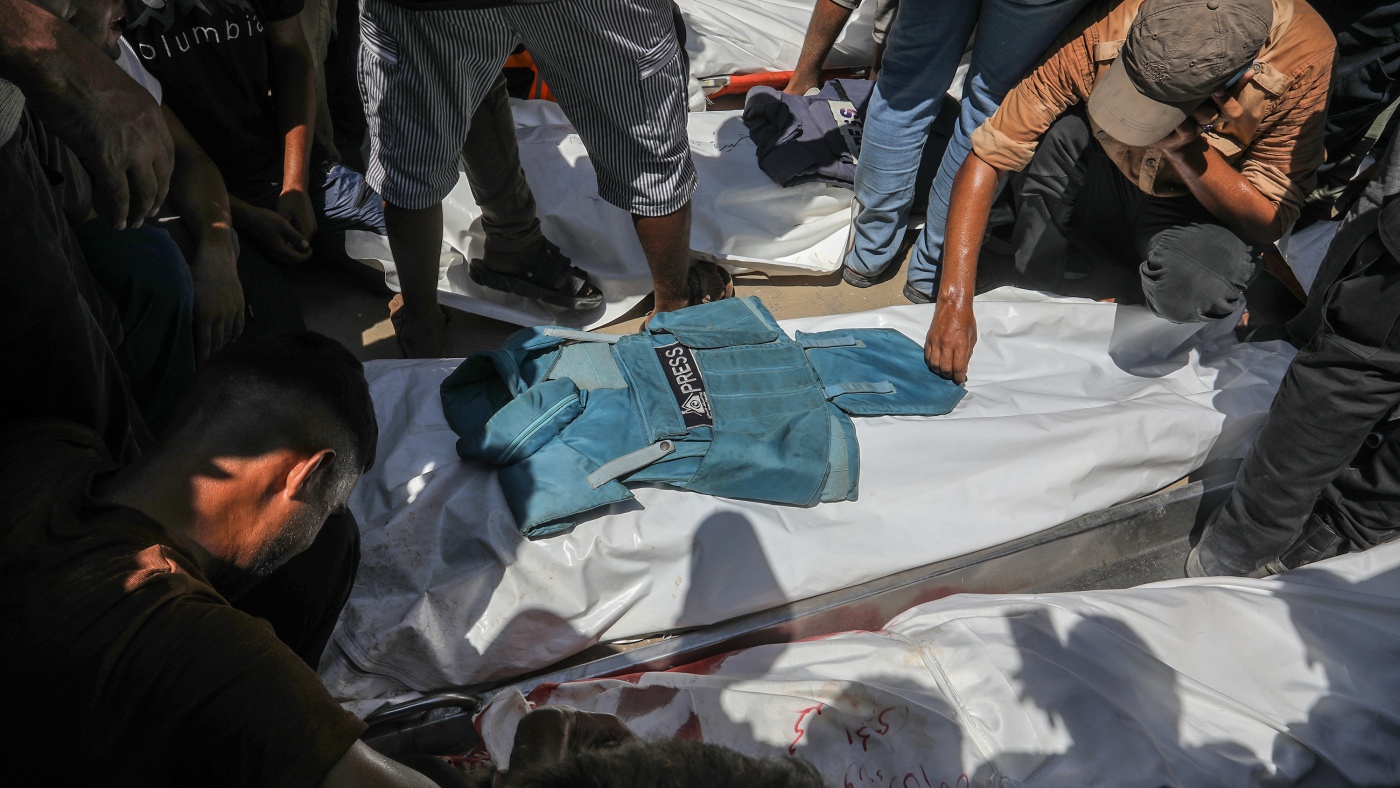World
Israeli Strikes on Gaza Hospital Claim 22 Lives, Including Journalists

Israeli airstrikes on the Nasser Hospital in Khan Younis, Gaza Strip, resulted in the deaths of 22 individuals, including five journalists, on October 30, 2023. These strikes have drawn international condemnation and a rare expression of regret from the Israeli government. The death toll was confirmed by the morgue at Nasser Hospital, a facility that remains one of the few operational hospitals in the region amid ongoing conflict.
The journalists, who worked for several prestigious international outlets such as The Associated Press, Reuters, and Al Jazeera, were killed in two successive attacks targeting the hospital’s open stairwell on the morning of the incident. The first missile struck around 10:00 a.m. while Hussam al-Masri, a cameraman for Reuters, was broadcasting live from the scene, capturing images of Israeli military positions nearby. Just moments later, a second missile hit the same location as rescue workers rushed to aid their injured colleagues.
Eyewitness accounts reveal the chaos that ensued following the strikes. A reporter from Al-Ghad news channel documented the moment of the second attack in real-time, exclaiming on air, “Oh God, the rescuers are gone. They killed the people! They killed them.” The tragedy marks one of the deadliest days for journalists in the Palestinian territory, with reports indicating that 245 media workers have died due to Israeli attacks over the past 22 months.
In the aftermath of the attacks, colleagues and numerous others gathered to mourn the deceased journalists, who were prepared for burial with body armor labeled “PRESS” placed atop their bodies, wrapped in white sheets. Hatem Omar, a photojournalist with Reuters who was injured in the strikes, expressed outrage, stating, “This is a criminal enemy that wants to silence us.”
Among those killed was Mariam Dagga, a contributor to The Associated Press. Her recent work highlighted the dire humanitarian situation in Gaza, including the plight of severely malnourished children. In a poignant final video shared on social media, Dagga appeared frail, reflecting the toll the conflict has taken on journalists and civilians alike. The AP expressed profound sorrow over her death, noting that Dagga had evacuated her 13-year-old son from Gaza early in the war and had not seen him since.
The loss also extends to Moaz Abu Taha, another journalist with Reuters, who was confirmed dead alongside al-Masri. Reuters expressed its devastation over these losses and stated it was urgently seeking more information about the incident and medical assistance for Hatem Khaled, another contractor injured in the attack.
Al Jazeera confirmed that cameraman Mohammad Salama was the tenth of its journalists to die in the ongoing conflict, condemning the attack as an “atrocity.” The outlet highlighted the urgency of the situation, noting that just two weeks prior, six journalists were killed, including prominent reporter Anas al-Sharif, in a targeted Israeli airstrike.
The Committee to Protect Journalists (CPJ) expressed outrage over the strikes, emphasizing that the ongoing violence against journalists in Gaza has reached alarming levels. CPJ Regional Director Sara Qudah criticized the global community for its inaction regarding the safety of journalists, stating, “Israel’s broadcasted killing of journalists in Gaza continues while the world watches and fails to act firmly on the most horrific attacks the press has ever faced in recent history.”
The Foreign Press Association, which represents hundreds of journalists in Israel and the Occupied Palestinian Territories, called for accountability from the Israeli Defense Forces and the Prime Minister’s Office. In a public statement, they demanded a thorough explanation regarding the attacks and emphasized the critical need for the protection of journalists operating in conflict zones.
The Israeli military acknowledged the attack within hours but had not provided specific details regarding the targeting of the strikes. Brig. Gen. Effie Defrin, an Israeli military spokesperson, stated, “The IDF does not intentionally target civilians,” expressing regret for any harm to uninvolved individuals. The office of Israel’s Prime Minister later issued a statement expressing deep regret for the “tragic mishap” at the hospital, while reiterating the importance of the work conducted by journalists and medical staff.
As the international community grapples with the implications of this incident, the loss of life at Nasser Hospital serves as a somber reminder of the dangers faced by journalists in conflict zones and raises urgent questions about the protection of civilians and the media in ongoing hostilities.
-

 Lifestyle4 months ago
Lifestyle4 months agoLibraries Challenge Rising E-Book Costs Amid Growing Demand
-

 Sports3 months ago
Sports3 months agoTyreek Hill Responds to Tua Tagovailoa’s Comments on Team Dynamics
-

 Sports3 months ago
Sports3 months agoLiverpool Secures Agreement to Sign Young Striker Will Wright
-

 Lifestyle3 months ago
Lifestyle3 months agoSave Your Split Tomatoes: Expert Tips for Gardeners
-

 Lifestyle3 months ago
Lifestyle3 months agoPrincess Beatrice’s Daughter Athena Joins Siblings at London Parade
-

 World3 months ago
World3 months agoWinter Storms Lash New South Wales with Snow, Flood Risks
-

 Science4 months ago
Science4 months agoTrump Administration Moves to Repeal Key Climate Regulation
-

 Science3 months ago
Science3 months agoSan Francisco Hosts Unique Contest to Identify “Performative Males”
-

 Business4 months ago
Business4 months agoSoFi Technologies Shares Slip 2% Following Insider Stock Sale
-

 Science4 months ago
Science4 months agoNew Tool Reveals Link Between Horse Coat Condition and Parasites
-

 Sports3 months ago
Sports3 months agoElon Musk Sculpture Travels From Utah to Yosemite National Park
-

 Science4 months ago
Science4 months agoNew Study Confirms Humans Transported Stonehenge Bluestones








